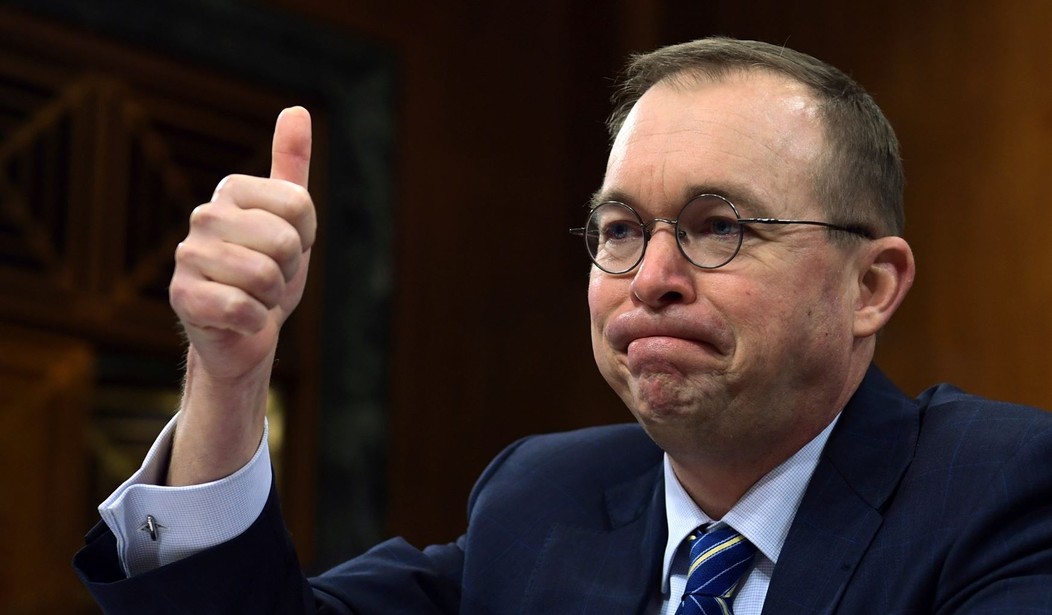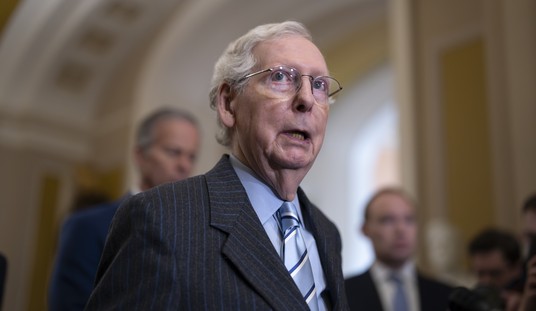Quietly, but oh so convincingly, Mick Mulvaney wrestled the Consumer Financial Protection Bureau (CFPB) over the holiday from the grips of an Obama-era crony holdover who had hoped to run it as a rogue agency.
CFPB Deputy Director Leandra English finally dropped her absurd legal challenge against Mulvaney, who is serving as the Bureau’s interim director after the departure of Richard Cordray. English recognized she couldn't budge Mulvaney on his principled leadership style at the agency, and not only dropped her lawsuit, but also announced her resignation from the CFPB. I guess she saw the writing on the wall after President Donald Trump announced he would officially nominate a permanent director, Kathy Kraninger, to follow in Mulvaney's footsteps. For whatever reason, even though the Democrats lost the 2016 election, they felt they should still be in charge at the CFPB.
Mulvaney’s tenure as interim director has been magnificent. In a move unheard of in Washington, he requested a 20% budget cut and he has sought to take the Bureau from out of the pocket of the Federal Reserve and subject to Congressional appropriations, and thus, oversight. And the American people send their thanks.
He set a new tone right out of the gate in a memo to staff. “We don’t just work for the government,” Mulvaney said, “we work for the people.” If only every agency head felt this way.
Recall that the Democrats’ initial vision for the CFPB was to be the “new cop on the beat” and to “push the envelope” with businesses it sought to investigate. It was the vehicle by which they were to micromanage every industry, indeed every company, and they didn’t want to let go of that power just because the silly old voters decided to go in a different direction.
Recommended
Mulvaney should close out his interim tenure by wrapping up long-outstanding and mostly frivolous investigations, some dating back years, that drive up compliance costs and hinder good-faith actors and small businesses from growing or planning for the future.
Take the case of the Zillow Group - the home sales and resources website. The CFPB recently informed Zillow that it was ending its investigation into the online company’s advertising practices. The CFPB had been investigating Zillow because it suspected its so-called “co-marketing” advertising program violated a law dating back to 1974. The Bureau began its investigation last year. Mulvaney's CFPB swiftly concluded no wrong-doing and that it would take no enforcement action against Zillow.
This is good news and shows the effectiveness of Mulvaney's strong conservative leadership and admirable restraint on the part of the CFPB. And yet, Zillow still had to absorb significant legal and compliance costs associated with the investigation. In return, they got a letter from the CFPB and a few short blurbs on Internet news sites acknowledging their clean bill of health. Now just imagine how damaging and frustrating these lingering investigations are for small businesses who can't easily pay these exorbitant fees and costs.
There are still scores of similar investigations on the books at the CFPB. Some date back to the housing crisis, to which the CFPB was formed as a response. Andrea Riquier writes in Market Watch that, “The acting head of the CFPB, Mick Mulvaney, said in April that he had the legal authority to drop investigations then pending at the CFPB, without having to explain the action.” He should use that legal authority to clear the books on outstanding investigations before he hands the reins of the CFPB over to his successor.
The principle of a government agency designed to protect consumers from questionable financial products and services is not objectionable in and of itself. But a great deal rides on the execution. Under folks like Richard Cordray and Leandra English, the CFPB was a threat to every company trying to conduct business. Mick Mulvaney has brought much-needed reforms and a strong and principled leadership style to the Bureau. And thank goodness he did.





















Join the conversation as a VIP Member